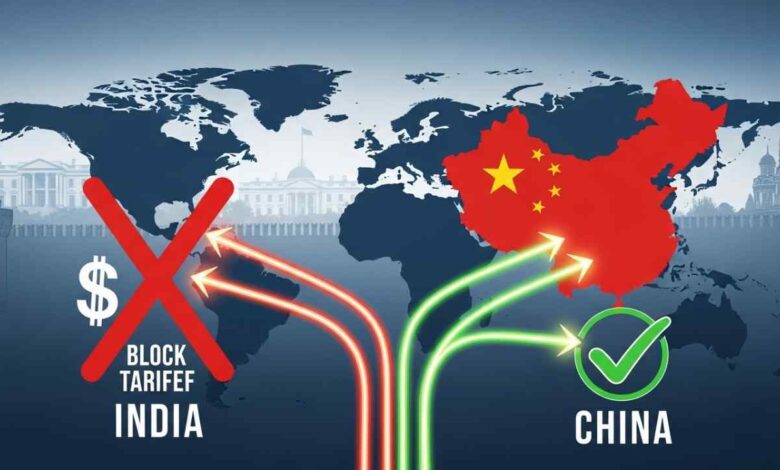US tariffs on India: Why the US Imposed Tariffs on India but Spared China – What’s the Real Reason?

US tariffs on India: In a recent move, the Trump administration has adopted a controversial policy regarding Russian oil imports, which is being criticized for its double standards towards India and China. Under this new policy, the United States has imposed harsh tariffs on India while giving China a waiver for the same reason. The purpose of this report is to highlight the complex geopolitical and economic factors behind this decision.
Background of Sanctions on Russian Oil
Following Russia’s invasion of Ukraine, the United States and its allies took various steps to reduce Russia’s oil revenue. In 2022, the Biden administration introduced a price cap mechanism, limiting the price of Russian oil to $60 per barrel. Countries like India and China were warned of sanctions related to shipping and insurance if they bought oil above this price.
The Trump Administration’s New Policy: The Application of Tariffs
However, the Trump administration has made a significant change to this policy. Instead of imposing direct sanctions on oil imports, they have decided to levy tariffs on the exports of countries that bypass Russian sanctions. The main objective of this policy is to create economic pressure to deter countries from buying Russian oil.
India vs. China: A Victim of Double Standards
This new US tariff policy has shown a completely different approach towards India and China, sparking a storm of discussion in the international community.
- Harsh Measures Against India: The United States has announced a 25% tariff on Indian exports, which is set to increase to 50% by August 27th. The reason cited for this decision is India’s significant purchase of Russian oil. According to US officials, India is an “easy target” and, as a strategic partner, should not be supporting Russia’s economy.
- Exemption for China: On the other hand, China has been given a 90-day reprieve from tariffs. The Trump administration has publicly stated, “China is too big to sanction.” China is Russia’s largest oil customer, importing approximately 2 million barrels per day, which accounts for 40% of Russia’s total crude oil exports.
What is the Reason for This Double Standard?
US Secretary of State Rubio explained the reasons behind this dual policy. According to him, imposing sanctions on Chinese refiners would cause the global supply chain to collapse, severely impacting Europe in particular, as it relies on refined Russian oil from China.
Furthermore, sanctioning China could lead to a spike in global oil prices by $6-$10 per barrel, causing inflation in the United States and damaging Trump’s domestic popularity. In comparison, imposing sanctions on India would not have a significant impact on global oil prices, as India imports about 1.5 million barrels per day, which the US considers “manageable.”
Geopolitical Consequences
This policy has far-reaching geopolitical implications:
- India: Relations between the US and India have deteriorated. As a result, India may lean more towards Russia and the Middle East and could enhance its strategic ties with China.
- China: China has emerged as the biggest winner in this situation. It is avoiding economic punishment, securing cheap oil, and increasing its geopolitical leverage over both Russia and Europe.
- United States: While prioritizing its economic stability, the US is jeopardizing its Indo-Pacific strategy by alienating India. The US administration has admitted that this is a double standard but has taken this step in its own strategic interest.

